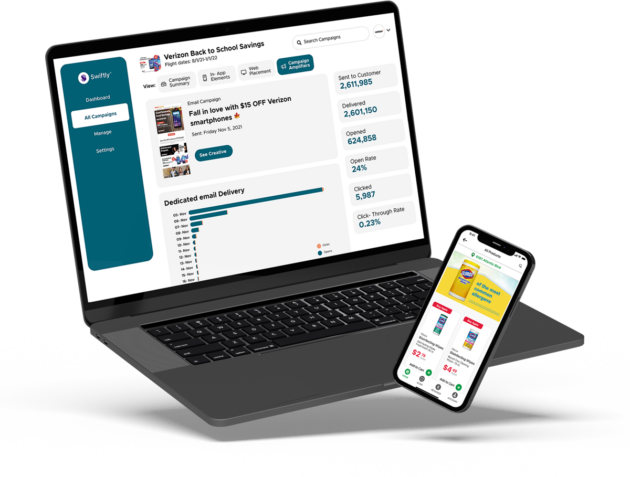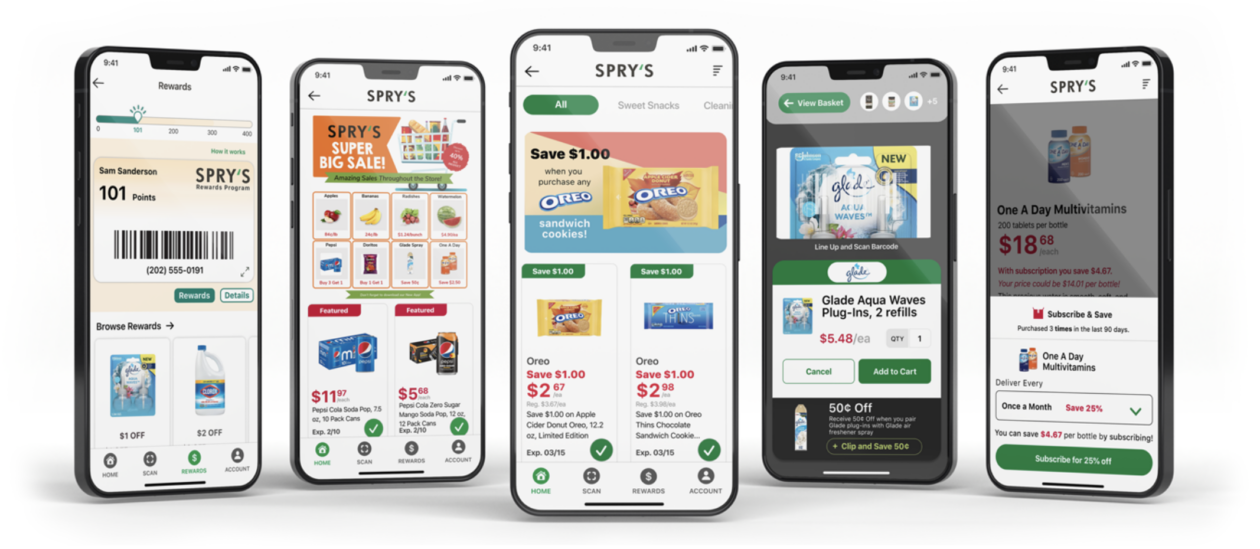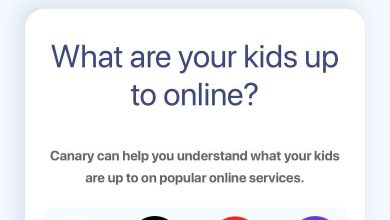Seattle provides one other unicorn as grocery retail tech startup Swiftly raises $100M

Retail software provider Swiftly raised $100 million in a Series C funding round, helping the company become the latest Seattle-area startup to reach a $1 billion valuation.
The round, led by Hong Kong-based BRV Capital Management, marks Swiftly’s second $100 million financing round in less than six months.
Swiftly provides brick-and-mortar grocers with branded phone apps designed to help retailers gather highly valuable customer data and earn advertising dollars while improving shoppers’ experience in the store. The apps can help consumers find what they’re looking for in the aisles, recall past purchases and skip lines by scanning products and paying with their phones.
Founded in 2018, Swiftly has now captured roughly 10% of the nation’s grocery store marketplace, said Sean Turner, the company’s CTO. The 150-person startup serves 22,500 stores, each operated by companies with $1 billion in annual revenues or more.
“Our onboarding teams are working as fast as they can,” said Turner, who co-founded Swiftly in 2017 with fellow Symphony Commerce veterans Henry Kim (Swiftly’s CEO), Karen Ho and Daniel Kim.
The data collected by Swiftly-powered apps is used to sell highly calibrated advertising to food brands jockeying for shoppers’ attention. Turner said it also helps those brick-and-mortar grocers gain ground against e-commerce goliaths such as Amazon and Walmart, which are investing heavily in their own grocery-related products and services.
Delivery giant Instacart is also a competitor, and on Monday announced Connected Stores, a set of technologies to “help grocers build a unified, seamless, personalized experience both online and in-store.”
Other startups are developing technologies for traditional grocers, such as fellow Seattle company Veeve, which announced an update to its smart shopping-cart technology Monday.
Swiftly will use a portion of the new funding to expand into markets beyond the grocery business. The company has its eyes on brick-and-mortar stores selling home goods, home improvement, electronics, fashion and sporting goods.
For now, the company continues to operate primarily in the grocery sector, offering a range of software that, in addition to powering consumer phone apps, uses AI to monitor inventory and track consumer trends.
That business alone is booming, Turner said. The growth is driven in part by an assortment of social and macroeconomic shifts.

Turner said Millennials for the first time took up en masse preparing home-cooked meals during the pandemic. Before that, those young professionals had been far more likely to eat out.
“A whole generation learned how to cook during the pandemic,” Turner said, adding that those young shoppers are heading in larger numbers to grocery stores.
In addition, rising inflation caused consumers of all ages to rethink trips to restaurants and head to the grocery store. They’re preparing disciplined shopping lists, and they’re even factoring sky-high gas costs into their shopping trips, Turner said. Once those shoppers arrive at the store, they’re scrimping in ways they hadn’t been as recently as last year.
“Grocers are seeing record sales,” Turner said, but they’re also selling fewer units, because inflation has jacked up the price of virtually every item in the store.
People are spending more to buy less, Turner said, so they’re bypassing premium food brands and increasingly turning to discounts and sales offered through grocers’ apps.
Swiftly’s customer shopping data helps those shoppers draw up their grocery lists by finding deals and sale items — all while reaping advertising dollars for the retailer.
The phone apps, Turner said, “make it as easy to plan (shopping) trips as possible” while also offering grocers “the same tech capabilities The Big Three have,” a nickname for Amazon, Target, and Walmart.
Advertising calibrated with the aid of consumer data has become a huge business for retailers. Boston Consulting Group estimates such advertising revenues will climb to $110 billion and yield profits of $75 billion in 2026.
Grocers have historically collected some of that data from shopper loyalty cards. But Amazon, Target and Walmart have been particularly adept at leveraging precise e-commerce data to understand what a single shopper buys. Those giants of e-commerce use the data to sell companies’ highly calibrated advertising that serves up similar products consumers are likely to want.
Turner said consumer data has given e-commerce giants like Amazon a powerful advantage over traditional brick-and-mortar retailers. Amazon, he said, can lean heavily on its growing advertising revenues while investing tens of millions into its e-commerce and logistics infrastructures.
“If Amazon doesn’t have to make money selling stuff,” he said, “they’ll always be able to offer lower prices, a better customer experience. …That makes it extraordinarily important for grocers to have a technology platform that’s able to compete with that.”
It also means grocers, who have been historically slow to adopt new technology, are increasingly eager to adopt software that can, Turner said, put them “on the same playing field as Amazon.”
E-commerce revenue surged during the pandemic’s first year as consumers, isolated in their homes during COVID-19 lockdowns, turned to their screens to shop. Among the biggest economic riddles posed by the pandemic was whether consumers’ new e-commerce habits would stick once vaccines stifled the virus’s spread and shoppers began once again driving to the grocery store.
Today, Turner said, more than 80% of retail transactions occur in a physical store instead of online and 90% of grocery shopping takes place in a brick-and-mortar store instead of an app or web browser.
The pandemic onrush of grocery orders amounted in the end to “a temporary blip” in consumer behavior, Turner said.
“You would think nothing happened,” he said.
With Monday’s announcement, Swiftly joins the ranks of nearly 20 other Seattle-area “unicorn” startups who crossed the $1 billion valuation threshold in recent years.
“Our mission is to empower brick-and-mortar retailers to move from analog to algorithms, as winners in this new era of commerce will be determined by how fast they can reinvent their business to capture shoppers digitally and monetize those digital relationships,” Kim said in a statement.
Conclusion: So above is the Seattle provides one other unicorn as grocery retail tech startup Swiftly raises $100M article. Hopefully with this article you can help you in life, always follow and read our good articles on the website: Doshared.com




